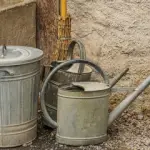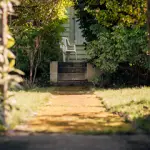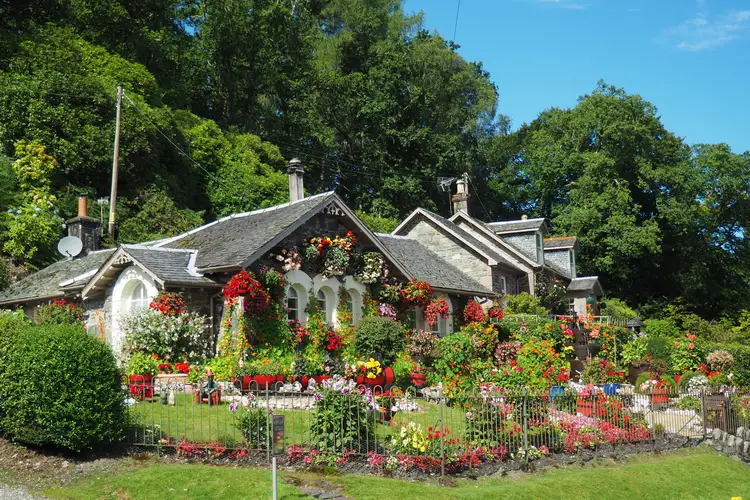
When you’re searching for a new house to live in there’s usually a compromise or two you have to make. But would you rather compromise on a bigger house or a bigger garden? From a question on Houzz, which was “Large garden, small house or small garden, big house?”, I counted up the votes. Although this isn’t conclusive, the results were:
- Small house large garden: 31
- Large house small garden: 10
- On the garden fence: 8
So which is better a bigger house or a bigger garden? If it’s a choice between a bigger house or bigger garden you should find a house with the biggest garden you can afford with a house that’s big enough to accommodate the size of your family. If the house is smaller than you want but big enough for now, if the garden is big enough you can extend.
Having said that, garden size can be quite polarising. You get some homeowners who hate the idea of a big garden vs others who love the outside space and prefer a bigger garden.
Sometimes small can be beautiful, but for me a large garden wins over every time, even though I’m not green fingered. But let’s take a closer look at this question in more detail.
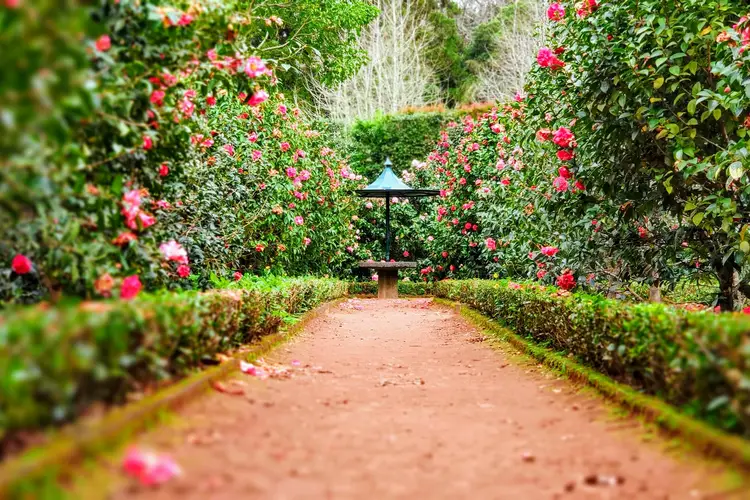
What makes the garden the right size for the house?
A garden should probably be at least equal in size to the foot print of the house or larger to make it the right size for the house. But it will depend on the type of property and where the property is located.
For example, a garden that’s smaller than the foot print of the house in a rural setting or on a edge of a village would be considered too small. But a town house in the middle of a city is more likely to have a much smaller garden in comparison.
Here’s a list of property types and how big or small the garden should be.
Garden size vs property type and location:
- Flats and apartments: Flats and apartments tend not to have a garden, but if they do they tend to be a shared space or a communal garden. Some apartments benefit from a balcony or a roof terrace as an added bonus, which will enhance its value.
- Town houses: Town houses tend to have smaller gardens in proportion to the footprint of the house. Which can often be courtyard size. Space is at a premium in larger cities, which means that town houses with larger gardens will be more expensive to buy. The further you move out from a city centre, the more likely the house will have a bigger garden.
- Village houses: Houses in rural villages tend to have larger gardens in proportion to the footprint of the house. For houses and cottages in villages it’s usual to expect the size of the garden to be larger than the footprint of the house.
- Country houses: Houses built in the countryside tend to have, and are expected to have, larger gardens in proportion to the size of the house. Country house gardens tend to be multiple times larger than the footprint of the house. The other benefit of country houses is the gardens tend to be secluded and not overlooked.
- New-build houses: Gardens in new developments tend to be on the small side. Another problem that newly built houses in developments have is the gardens tend to be overlooked.
- Family houses: Regardless of location, family houses with small gardens are often less popular than family houses with medium/large gardens. You may well limit your market when it comes to selling if you buy a house with the wrong size garden for the type of house.
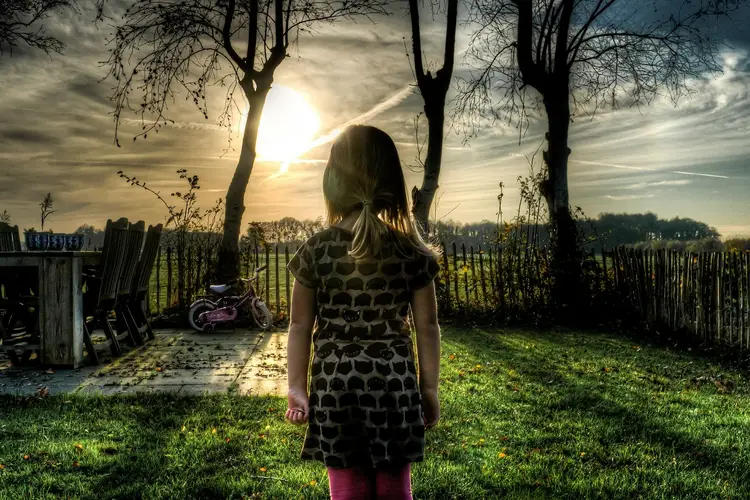
How to decide bigger house vs bigger garden?
There are a number of considerations when it comes to bigger house or bigger garden. These include:
- Size of your family: There’s no point in buying a small house with a big garden if the house doesn’t have enough bedrooms to accommodate your family. If the budget allows, you should try to buy a house the right size for your family, but with a garden that’s at least the right size for the house and big enough for the kids to play in.
- Your budget: If the property search results you have, that are based on your budget, has produced houses that are either too small, or they are big enough but with a small garden, consider changing your search to a cheaper area.
- Do you like gardening? If you love gardening, a larger garden may suit. But if you don’t like gardening, you can always hire a gardener. Plus you need to consider resale value too. Don’t buy a bigger house that has a garden that’s too small for its size purely because you don’t like gardening. Make the garden simple to maintain with a lawn. Then hire someone to cut the grass.
- Resale value: A house with a garden that’s too small for the type of house and location will be much harder to sell. However, if you’re buying the house to rent to tenants, tenants don’t always want the hassle of garden upkeep. So if the house is big enough to accommodate your family, a smaller house with a bigger garden is the better option. You can always extend the house into the bigger garden. But it’s more difficult to increase the size of a small garden.
- Do you have children? If you have children, outside space is important to have for them to play.
- Outside space nearby. If there are parks or woodlands nearby, this may compensate for a smaller garden.
- Pets: If you have pets, especially a dog, a larger garden is preferable.
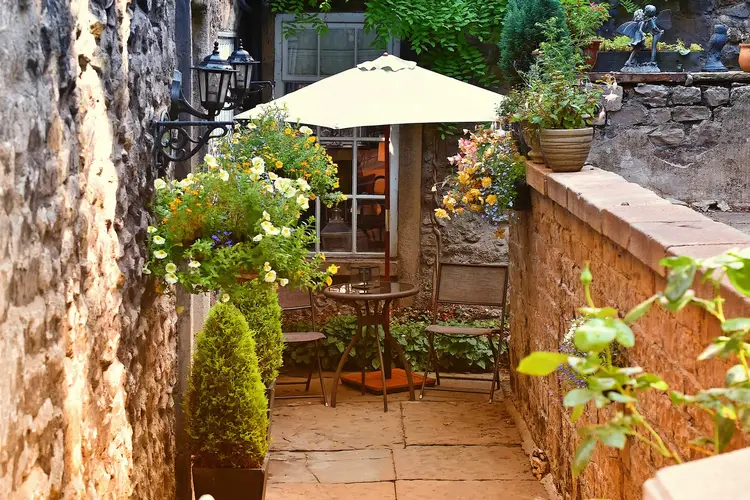
When is a garden considered small?
According to gardener Alan Titchmarsh, a small garden is one that’s no bigger than a tennis court, which is an area of approximately 260 square metres (310 square yards or 2,790 square feet). This represents a garden that has rough dimensions of 16 metres by 16 metres (52 by 52 feet).
However, whether a garden is considered small is down to opinion. Plus when it comes to the choice of garden size, this is down to personal preference and whether or not you like gardening.
When is a garden too small?
A garden is too small if the square meterage or square yard size is smaller than the footprint of the house itself. This is especially true of houses situated outside town centres and located in villages or in a rural setting.
Do houses with small gardens sell?
Houses with small gardens sell, as some people don’t like gardening. Also as people get older they tend to prefer smaller low maintenance gardens as these are easier to manage. Which means there will always be a market for houses with small gardens.
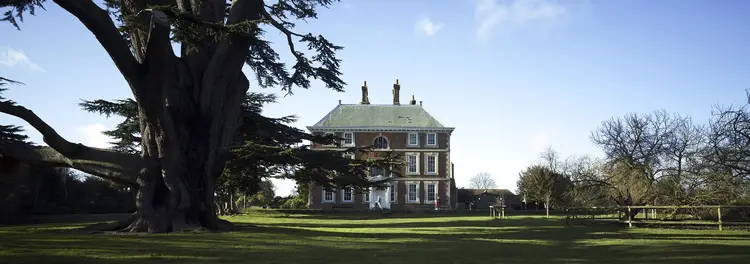
Can a garden be too big?
A garden can never be too big. But if you have a garden that’s too big for you to enjoy, here are some ideas:
- Section off a part of the garden and leave it to grow wild if the upkeep and maintenance of a large garden is too much.
- Hire a gardener to look after the large space.
- Part of a big garden could be sold off to neighbours who want a larger garden themselves. But if you don’t want your neighbour to sell-on this part of your garden to a developer, make sure you place a covenant on the land to prevent this.
- Sell off a section of the garden to developers. The disadvantage of this option is the newly built houses may overlook the part of your smaller garden you retain.
- Use part of the bigger garden to extend the house to create more value.
There’s always value in land, and the bigger the land area the more it will be worth. So if you find a house you can afford with a big garden which is big enough for you and your family, you should buy it.
It will be far easier to sell a smaller house with a big garden than it would be to sell a large house with a garden that’s too small for the house. Subject to the location of the house that is. However, since the Corona virus or Covid 19 outbreak, more homebuyers are looking for gardens an seclusion.
What are the benefits of a small garden?
The main benefit of a small gardens is they are lower maintenance and will be quick to create into a garden of your choice. Smaller gardens are cheaper to maintain too and as plants are expensive, planting the plants and flower of choice will be cheaper to achieve in a smaller garden.
Which is easier to sell a bigger house with a small garden or a smaller house with a bigger garden?
It will be easier to sell a house with a bigger garden, especially if the bigger garden is secluded and not overlooked. That’s not to say houses with smaller gardens don’t sell quickly, but the larger the garden , the more valuable the property.
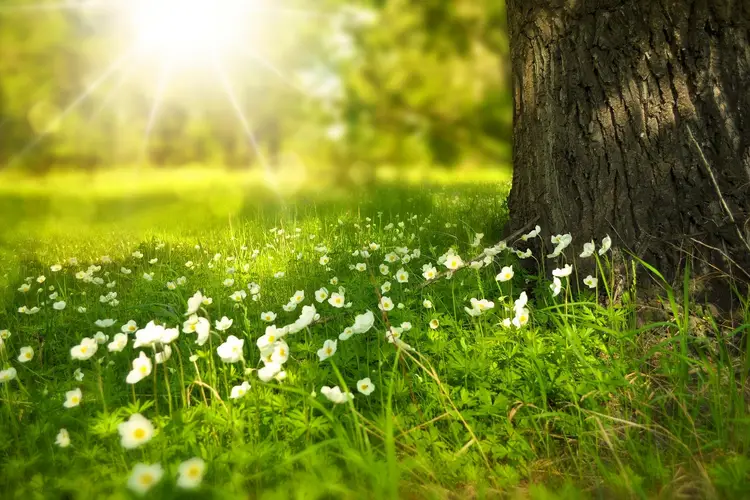
Other considerations other than garden size vs the size of the property
When you’re buying a house, it’s not just the size of the garden that’s important. In addition to the proportionate size of the house vs the size of the garden, you need to think about the following:
- Shape and width of the garden. For example, long narrow gardens are more difficult to turn into a great usable space.
- Garden access. If the only access to the rear garden is via the house, this is less desirable. It’s far better to at least have a side access gate.
- Size of the front garden vs the rear garden. Most people prefer to have more garden at the rear of the house rather than to have a large front garden and no rear garden.
- Is the garden overlooked? This is important to many homebuyers and seclusion is top of the list for many buyers.
- Garden’s usability. It’s not simply about the size of the garden, because you could have a house with a very big garden with a steep gradient that makes a large part of the garden unusable.
- Garden orientation. Which way the garden faces is very important. More people prefer a south facing garden than a north facing one. Houses with south facing gardens tend to achieve more money and sell faster.
- View beyond the garden. If the view beyond the garden is fields, this may compensate for a slightly smaller garden. But if the garden backs on to other houses, this may make the small garden less desirable.
To understand more about how important garden orientation is, please take a read of these two articles:
- The first is about should you buy a house with a north facing garden.
- The second is about should you buy a house with a north east facing garden.
Conclusion to how important is a garden when buying a house
If you buy a small house with large garden you can always build out. But the house ideally needs to be large enough to accommodate your family size at the time of buying. This way you’ll end up with a win win, a large house in a large garden, albeit smaller than when you first moved in.
It’s easy enough to change the size of a house, subject to obtaining the relevant planning permission, but it’s much more difficult to increase the size of a plot.
You should treat your garden as another room to your house. If it’s too small for the size of the house, this may may it difficult to sell.
I hope you’ve enjoyed this article about bigger house or bigger garden
If you’ve enjoyed this article about “how important is a garden when buying a house” please share it on your favourite social media site.
Also, if you have any questions, please feel free to comment below too. Alternatively, if you need more help, please feel free to contact us on our contact us page here. Or join the discussion and ask your question in the property forum.

